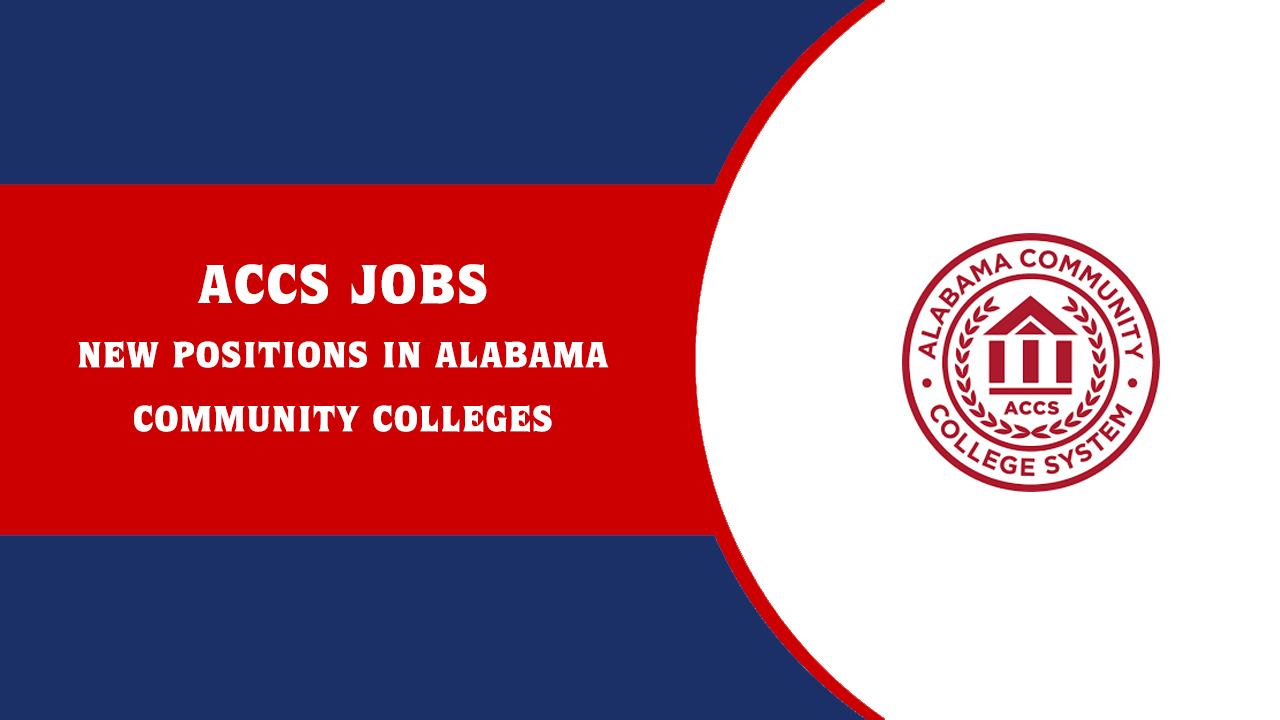Individuals who want to make a difference in the lives of students, adult learners, and entire communities will find that chance with ACCS jobs. For those residing in Alabama or interested in joining its community-focused workforce, the Alabama Community College System presents a wide selection of opportunities that suit various career paths and professional backgrounds. These jobs are ideal for those who value service and growth. The appeal goes beyond the classroom, reaching into departments such as finance, human resources, campus security, and student support services.
Job seekers interested in ACCS careers should note that the organization operates across a wide network of colleges and campuses in Alabama. This means that access to employment should be feasible. Beyond its convenience of location, the system’s reputation for fair hiring, competitive benefits, and long-term career advancement has made it a go-to option for both first-time applicants and experienced professionals. As more people consider careers with organizations that support community development, provide educational access, and offer a range of training services, ACCS stands out. So apply now!
For More Latest Private Jobs: Click Here
| Company Name: | ACCS |
| Job Locations: | United States |
| Last Updated on: | August 15th, 2025 |
ACCS Jobs For Students 2025 | Latest Job Opportunities

About the Alabama Community College System (ACCS)
Alabama Community College System has been a cornerstone of public education in the state for decades. Established in 1963, it was created through legislative action to unify Alabama’s two-year colleges under a single organizational structure. This move aimed to strengthen coordination, enhance educational access, and provide a consistent framework for vocational, technical, and academic training. Over time, ACCS has grown into a comprehensive system that now oversees 24 individual community and technical colleges spread across the state.
ACCS operates under the authority of the Alabama Community College System Board of Trustees. It governs policy decisions, program development, and administrative standards. The system’s office is located in Montgomery and serves as the administrative backbone for all colleges within its network. Each institution affiliated with ACCS serves the purpose of delivering quality education and workforce training to Alabama’s residents. Collectively, these colleges educate over 160,000 students annually, which makes ACCS one of the largest public higher education systems in the state.
ACCS Workplace Culture
The Alabama Community College System maintains a workplace culture deeply rooted in service, growth, and inclusivity. Education is at the center of everything they do. It shows in the way employees are encouraged to contribute not just to operations, but to a larger mission that benefits students statewide. The system’s leadership consistently reinforces a collaborative environment where all voices are heard and input from staff is valued in decision-making processes. New ideas and innovation are not only welcomed but often implemented through task forces and cross-functional teams.
Strong commitment to Diversity, Equity, and Inclusion is central to how the system operates. Employees come from a wide range of backgrounds, and the organization takes real steps to ensure equitable treatment at all levels. Training sessions focused on DEI topics, inclusive hiring practices, and ongoing policy reviews reflect a workplace that wants every employee to feel seen and supported. Beyond policy, the leadership team actively promotes respect, fairness, and representation throughout all departments. Among the other reasons to work here are:
- ACCS encourages staff to participate in community events, volunteer programs, and student engagement efforts that connect their roles to broader educational goals.
- Monthly workshops, guest speaker sessions, and peer networking forums are regularly hosted to encourage continuous learning and professional development.
- Leadership organizes listening sessions where faculty and staff can express concerns or offer suggestions directly to executive leadership without hierarchy barriers.
- Special initiatives support first-generation professionals and provide targeted resources for employees returning to work after career breaks.
- Flexibility is offered in many roles, with hybrid or remote work options available where possible, particularly in administrative and IT positions.
ACCS Jobs Near Me
Nearly every region has ACCS jobs available. The organization consists of 24 colleges, and each campus or satellite location brings with it a variety of job openings ranging from instructors and academic support to HR, IT, and operations roles. Whether someone lives in a major city or a more remote community, there are often jobs near them that match their qualifications. The centralized job portal makes it easy to filter listings by location, so applicants can zero in on roles that make sense geographically and personally.
Urban Campuses
Several ACCS colleges are located in Alabama’s most populous metropolitan areas, including Birmingham, Montgomery, and Mobile. These campuses typically offer a wide range of roles due to their size and complexity, such as multi-departmental faculty positions, large-scale administrative teams, and expanded student services offices. Working in these environments often means access to high-volume departments and a fast-paced atmosphere.
Suburban Campuses
Many ACCS colleges are positioned in suburban areas that serve as educational hubs for the surrounding communities. These campuses often strike a balance between a professional structure and a small-college charm. Staff working in these locations benefit from more integrated teams and more direct student interaction while still enjoying access to modern resources and programs.
Rural Locations
Rural campuses are critical to ACCS’s mission of making education accessible to every resident in Alabama. These colleges often serve as the primary institutions of higher learning in their region and offer deeply impactful roles. Employees on rural campuses tend to work in close coordination with their communities and often hold roles that wear many hats, giving them broad experience and meaningful engagement.
Using the Job Portal
ACCS’s online job portal simplifies the process of finding opportunities close to home. Users can filter by college, zip code, or specific city to find listings that fall under the category of ACCS jobs near me. This functionality is especially helpful for applicants juggling family needs, travel concerns, or other location-based priorities. All listings include detailed job descriptions, application steps, and salary range information.
Types of Jobs at ACCS
Professionals across industries and specialties can apply for ACCS jobs. Whether you’re coming from an educational background or pivoting from another career path, there’s likely a place for your skillset. Spread across its 24 colleges, the job landscape includes roles that are academic, technical, operational, and administrative. These roles contribute to the overall mission of the system in different ways, and the availability of various departments means there are numerous entry points for new applicants. Their most common positions are listed below.
Academic & Faculty Positions
Faculty roles are the backbone of ACCS institutions. Instructors are needed across general education disciplines like English, math, science, as well as career and technical fields such as welding, HVAC, and the health sciences. Many of these roles require a master’s degree or specific industry certifications, depending on the subject. Faculty may also participate in curriculum development, student advising, and department leadership depending on the size and needs of the college.
Administrative & HR Roles
Administrative professionals handle everything from admissions and records to payroll and institutional compliance. Human Resources teams are responsible for managing employee relations, benefits, recruitment, and DEI initiatives. These roles often require strong organizational and communication skills, and they support the operational health of each college campus.
IT & Tech Jobs
Technology roles within ACCS continue to expand as the system modernizes its infrastructure. IT staff manage networks, troubleshoot systems, develop digital learning platforms, and secure sensitive data. Roles in this area can range from help desk support to network administrators and cybersecurity analysts. Experience with higher education tech systems is often a plus but not always required.
Student Services & Counseling
Counselors, academic advisors, and student success coordinators guide students through their educational journey. These professionals assist with course planning, mental health support, career advising, and connecting students with resources. These roles demand empathy, communication skills, and knowledge of institutional processes that help students stay on track.
Skilled Trades & Facility Management
The system also employs skilled trade professionals such as electricians, HVAC technicians, maintenance crews, and groundskeepers. These roles ensure that campuses run smoothly and remain safe, functional environments for students and staff. Facility management staff often work closely with administrative teams to prioritize upkeep, repairs, and compliance with safety standards.
Healthcare & Nursing Roles
Healthcare is a major focus of ACCS, with many colleges offering nursing and allied health programs. To support these areas, the system employs registered nurses, lab technicians, clinical instructors, and healthcare coordinators. These positions are critical for training future healthcare professionals while also maintaining high safety and accreditation standards within labs and clinical spaces.
Benefits and Salary Schedule
People who apply for ACCS jobs enjoy many benefits that are far beyond what is typically offered in the workplace. Healthcare insurance is comprehensive and includes options for medical, dental, and vision care, with coverage that accommodates both individuals and families. Retirement planning is also a major asset, with access to the Teachers’ Retirement System of Alabama, which offers one of the most competitive pension plans in the region. Additional perks such as paid vacation leave, personal days, and extended sick leave create a well-rounded work-life balance for employees at every level.
Transparency is a key part of the compensation structure at ACCS. Every position is assigned a salary range based on published schedules that are available for public review. This openness builds trust between the system and its workforce, as employees can clearly understand how their pay is structured and what promotion looks like. For example, instructors typically earn between $45,000 and $72,000 annually depending on their experience, qualifications, and workload. Administrative assistants might start at around $30,000 and grow into roles that pay over $50,000 with time and performance. Additionally, they offer the following benefits.
- Employees receive tuition discounts for themselves and, in many cases, for immediate family members, encouraging ongoing education and growth.
- Vision and dental coverage includes preventative care, orthodontics, and family plans that cover dependents.
- Retirement benefits through the Teachers’ Retirement System include employer contributions, vesting timelines, and post-retirement healthcare options.
- Employees have access to wellness programs that offer resources for fitness, mental health, nutrition, and stress management.
- Life insurance is included in all employment packages, with options to increase coverage based on family needs or income changes.
- Parental leave and family medical leave are available to support new parents and caregivers without penalty.
Eligibility Criteria
Eligibility for ACCS jobs depends on the specific position, but educational qualifications are one of the first things applicants need to consider. For many administrative assistant or facility maintenance roles, a high school diploma or equivalent is a basic requirement. Jobs that fall into mid-level roles, like student support or career advising, usually call for an associate’s or a bachelor’s degree. Alternatively, instructional positions at the college level typically require a master’s degree in the relevant field, along with some teaching experience or evidence of instructional ability. For technical faculty, such as those teaching HVAC or automotive programs, industry certifications can sometimes substitute for advanced degrees. In addition, they also have these criteria.
- Some colleges give hiring priority to applicants who have previously worked in public education or who have completed internships within the ACCS system.
- Many technical positions request a portfolio of completed work or proof of hands-on projects to demonstrate competency beyond formal education.
- For positions involving minors or dual-enrollment students, additional clearance procedures may apply, including more intensive background checks.
- Roles funded by federal grants or workforce programs sometimes include eligibility rules tied to grant requirements, such as veteran status or residency.
- Certain jobs ask for proof of continuing education or participation in professional development within the past 12 months.
- Candidates applying for roles with supervisory duties must often submit prior employee evaluations or letters of recommendation as part of the process.
- Applicants with bilingual skills are encouraged to apply, especially for positions in student services or adult education, where language access is vital.
Application Process for ACCS Jobs
Applying for ACCS jobs is made easier with the NeoEd application platform, a cloud-based system designed to simplify the hiring process for both applicants and hiring managers. To begin, prospective candidates should visit the official ACCS job portal and create a personal account. This account serves as a centralized hub where applicants can manage their profiles, upload necessary documents such as resumes and certificates, and track the status of their applications in real time. The platform’s user-friendly interface allows efficient searching through job postings, enabling users to search for positions by title, department, or location.
Once a suitable position is identified, applicants can complete their profiles by entering detailed information about their education, work history, and references. After ensuring all required fields are accurately filled in and relevant documents are uploaded, candidates can submit their applications directly through the platform. The NeoEd system provides immediate confirmation of submission and keeps applicants informed of any updates or changes to their application status. It’s important to note that ACCS no longer accepts paper applications and all application materials must be submitted electronically via the NeoEd system.
Summary
For anyone looking to work in a system that combines public service, professional growth, and long-term career potential, ACCS jobs offer one of the most rewarding paths in Alabama’s employment landscape. With a strong focus on inclusion, innovation, and educational excellence, the Alabama Community College System continues to attract talent that is passionate about making a difference. Whether you’re an educator, an administrator, a technician, or someone with a heart for helping others, now is the time to explore the open positions and take that first step toward a career that truly matters.
 Find Newest Jobs in USA
Find Newest Jobs in USA



